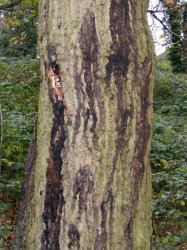Team work between Forest Research, Bangor University and others has for the first time, tracked down the cause of the stem bleeding symptoms of acute oak decline (AOD). Using the latest scientific methods they have revealed a multi-bacterial cause of the stem bleeding and pioneered novel methods for analysing the causes of complex plant diseases.
AOD is disease of native oak and is found particularly in East Anglia, the Midlands, Welsh Borders and south east Wales. It is a complex disease which appears on the stems of oak trees as patches of black fluid weeping from bark cracks, which cover over rotting tissue. In severe cases the stem rot can ring almost the entire girth of trees, preventing them from using water and nutrients essential for growth. The trees become weak and can die.
The study, recently published in The ISME Journal, concludes that a mixture of different bacterial species cause the stem bleed in AOD. The authors explain that the complex nature of the disease makes identifying the cause of it challenging. A number of complementary scientific methods were used to discover the cause of the stem weeping and rot typical of the disease, providing a new means of identifying and studying complex plant diseases.
Now that the causes of the stem weeping symptoms AOD have been established, scientists can work towards finding ways to halt the disease. This new means of identifying complex plant diseases can now also be used in other contexts.
The authors are grateful for support for the work from Woodland Heritage, the Rufford Foundation, the Monument Trust, the JPG fund, HPC Wales, the Forestry Commission and DEFRA (TH0108).
Find out more about research on acute oak decline.

